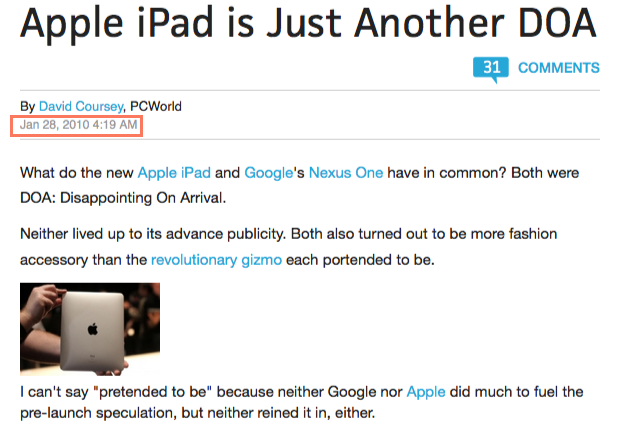Search Better (2012) -
Judging Online Information

Search Better (2012)
Judging Online Information


/en/searchbetter/how-to-read-a-webpage/content/
There is a newer version of this lesson. Go here to check it out.
If you're looking for information, the Internet has a lot of it. The problem is, you can't trust every website you find. You'll need to evaluate each website to decide whether it's reliable. Let's look at some of the questions you should ask yourself whenever you view a website.
Watch the video below to learn some tips for judging online information.
No matter how good a website is, you should always ask yourself whether it contains the information you're looking for. Remember, just because the site comes up in a Google search doesn't mean it's relevant. For example, if you're searching for information about the history of skateboards, a site that sells skateboards may not have what you're looking for.

There are many types of sites on the Internet. Encyclopedias, online stores, blogs, and humor sites all have different purposes. Determining the site's purpose can help you decide how reliable it is.
In order to get the most reliable information, it's best to stick to unbiased sources. News organizations, encyclopedias, and other sources have traditionally tried to stay unbiased. This helps them build a reputation as a trusted source.
Most websites don't try to stay unbiased like a newspaper would. And that's OK for casual web browsing. However, if you're trying to find reliable information, it can be a real problem. For example, if a news blog is biased, it may distort the story or leave out important information.
Every web address has a top-level domain. Some common examples are .com, .org, .gov, and .edu, although there are many more.
Online articles don't always say who the author is. This doesn't mean these sites are less reliable. However, if there is an author listed, it's a good idea to find out more information about the author.
Many websites will include a date at the top or bottom of an article. This can tell you how current the information is. For some subjects (such as biographies of historical figures), this may not matter as much. However, for technology, news, politics, and other subjects, it may be important to have the most current information available.
In the example below, the article is talking about an older version of the iPad, so it may not be relevant if you're thinking of buying a new one.

You can't always rely on the site itself because many sites try hard to disguise their purpose. You may need to get a second opinion—in other words, see what other people are saying about the website.
Evaluating websites takes practice. We've already looked at some basic techniques you can use, but these techniques may not work on every website you find. You'll often need to use your critical thinking skills to make a good judgment.
Click the arrows in the slideshow below to see an example of how you can judge a website.
Let's say your friend sends you an email containing an amazing "fact" or story. Even if you trust your friend, it doesn't mean the email is true. Chain emails can quickly spread around the world, and they often contain misinformation, hoaxes, political propaganda, and worse. Instead of simply forwarding the email to your other friends, take a moment to verify that the information is true.
One of the easiest ways to do this is to go to snopes.com and search for the story. Snopes is a well-known and trusted source for verifying Internet rumors. A typical Snopes entry will tell you whether the information is true or false, and it will also tell you where the story originated.
Go to DHMO.org to help determine whether the information is reliable.
Depending on who you ask, you may get very different answers about whether Wikipedia is reliable:
The truth is, it depends on how you use Wikipedia. It can be a great starting point for your research, but you shouldn't assume all of the information is true. Instead, use the references at the bottom of an article to find the original sources. Then you'll need to evaluate these sources to see whether they are reliable.
Keep in mind that some Wikipedia articles are better than others. For example, try comparing the following two articles:
No matter what type of research you're doing, it's important to look at multiple sources. Even a reliable website may not include all of the relevant information. Using multiple sources allows you to see all sides of a story, which gives you a better perspective than if you had only looked at one source.
/en/searchbetter/evaluate-a-webpage-practice/content/